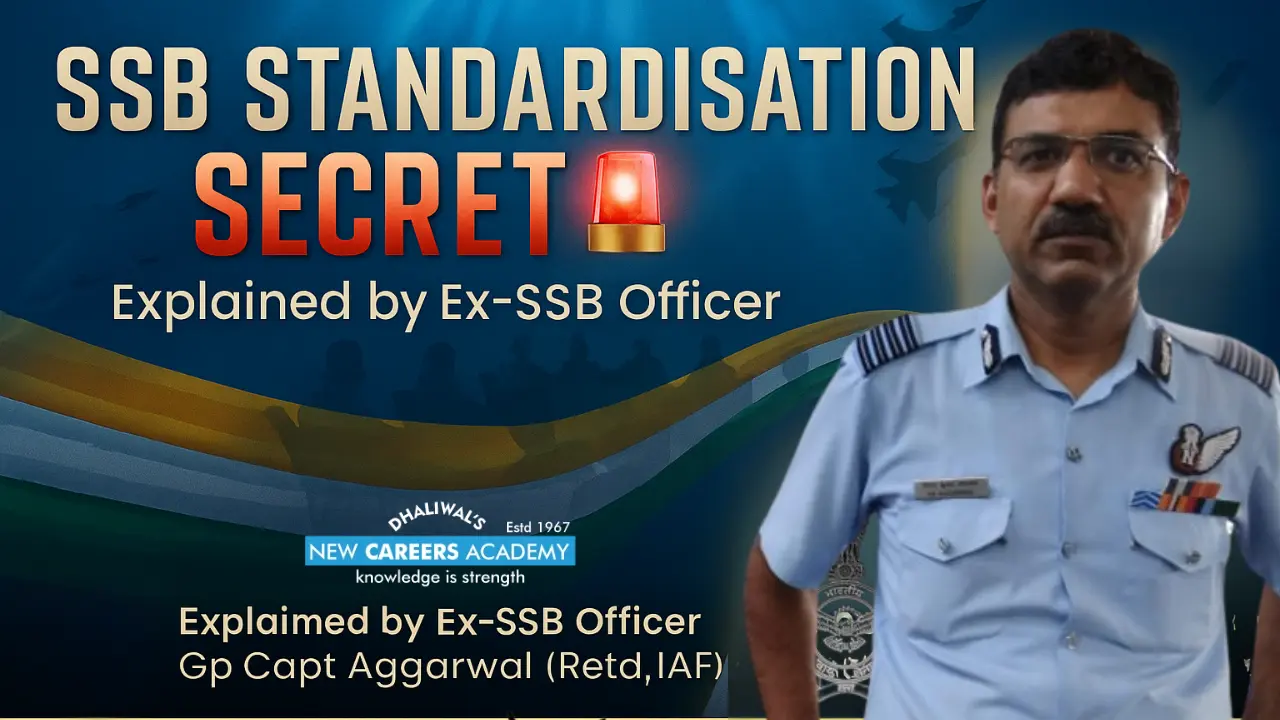"Why Honesty at SSB Matters: The Snowball Effect of a Small Lie"
Standardisation Process at the SSB Interview – Explained by Former IO Group Captain Aggarwal
Introduction
The Services Selection Board (SSB) interview is one of the toughest and most prestigious defence selection processes in India. Every candidate aspiring to join the Indian Army, Navy, or Air Force must go through this rigorous 5-day evaluation procedure. But how does the board ensure fairness, consistency, and accuracy while assessing thousands of candidates every year?
This is where the standardisation process comes into play. To shed light on this, Former Interviewing Officer (IO) and Group Captain Aggarwal, with years of SSB experience, explains how standardisation works and why it is critical to the credibility of the SSB.

What is the Standardisation Process at the SSB Interview?
- Standardisation means ensuring that all candidates are evaluated on the same scale regardless of the board, location, or assessor.
- The process is applied across the three assessors:
- Psychologist
- Group Testing Officer (GTO)
- Interviewing Officer (IO)
- Each candidate’s performance is mapped against a defined scale of Officer-Like Qualities (OLQs).
Group Captain Aggarwal explains that standardisation ensures no candidate is over-assessed or under-assessedsimply because of the board’s location, the time of year, or the assessor’s perception.
Why is Standardisation Important at the SSB?
- Fairness: Every candidate competes on an equal platform.
- Consistency: Evaluations remain uniform across all 33 SSB centers in India.
- Reliability: Ensures that selections are based on merit, not subjective bias.
- Transparency: Builds candidate trust in the SSB process.
As Group Captain Aggarwal says:
“Without standardisation, the credibility of the SSB would be questioned. It ensures the right candidates are selected purely based on potential.”
How Standardisation is Maintained in the SSB Interview?
1. Psychologist’s Assessment
- The psychologist evaluates Written tests (TAT, WAT, SRT, SD).
- Candidate responses are compared against thousands of benchmarked answers stored in a reference database.
- Every psychologist is trained to align evaluation to pre-determined OLQ standards.
2. GTO’s Assessment
- The GTO observes candidates in group tasks, outdoor activities, discussions, and command tasks.
- Even though situations may vary, the grading scale remains constant.
- GTOs undergo training and calibration sessions to ensure they grade consistently across boards.
3. Interviewing Officer (IO) Assessment
- Group Captain Aggarwal, as an IO, explains how interviewers use a structured questionnaire.
- IOs are trained to reduce subjective bias and evaluate candidates based on communication, reasoning, leadership, and confidence.
- The IO’s marks are then standardised with the psychologist and GTO scores.
4. Cross-Verification & Standardisation Board Meetings
- After assessments, standardisation boards review cases where results deviate.
- This ensures that no assessor’s personal bias skews the outcome.
- All assessments are brought back to the common OLQ benchmark.
Group Captain Aggarwal’s Key Insights on Standardisation
- Candidate’s background doesn’t matter: Rural or urban, English-speaking or Hindi-speaking, everyone is judged equally.
- Consistency across batches: A candidate appearing in Bhopal SSB is evaluated on the same scale as someone appearing in Allahabad or Bangalore SSB.
- No favoritism or discrimination: The process is designed to eliminate bias.
Common Myths About SSB Standardisation
❌ Myth 1: Candidates from metro cities are given preference.
✅ Truth: Evaluation depends only on OLQs, not background.
❌ Myth 2: SSB selection is luck-based.
✅ Truth: Standardisation ensures it is merit-based.
❌ Myth 3: IOs or GTOs can select candidates at will.
✅ Truth: Final recommendations are cross-verified through standardisation boards.
How Candidates Should Prepare Keeping Standardisation in Mind?
- Focus on OLQs: Self-confidence, leadership, teamwork, and reasoning ability.
- Avoid cramming answers: Psychologists can identify rote learning.
- Be authentic in interviews: IOs like Group Captain Aggarwal stress on honesty.
- Perform consistently in all tasks: Since marks are standardised, strength in one area must balance others.
Conclusion
The standardisation process at the SSB interview, as explained by Group Captain Aggarwal, ensures that the best candidates are selected fairly to become officers in the Indian Armed Forces. It eliminates bias, maintains consistency across boards, and upholds the integrity of the selection process.
For aspirants of NDA, CDS, AFCAT, and CAPF 2026, understanding standardisation is crucial. It reassures candidates that their selection depends solely on their performance, OLQs, and potential, not external factors.





